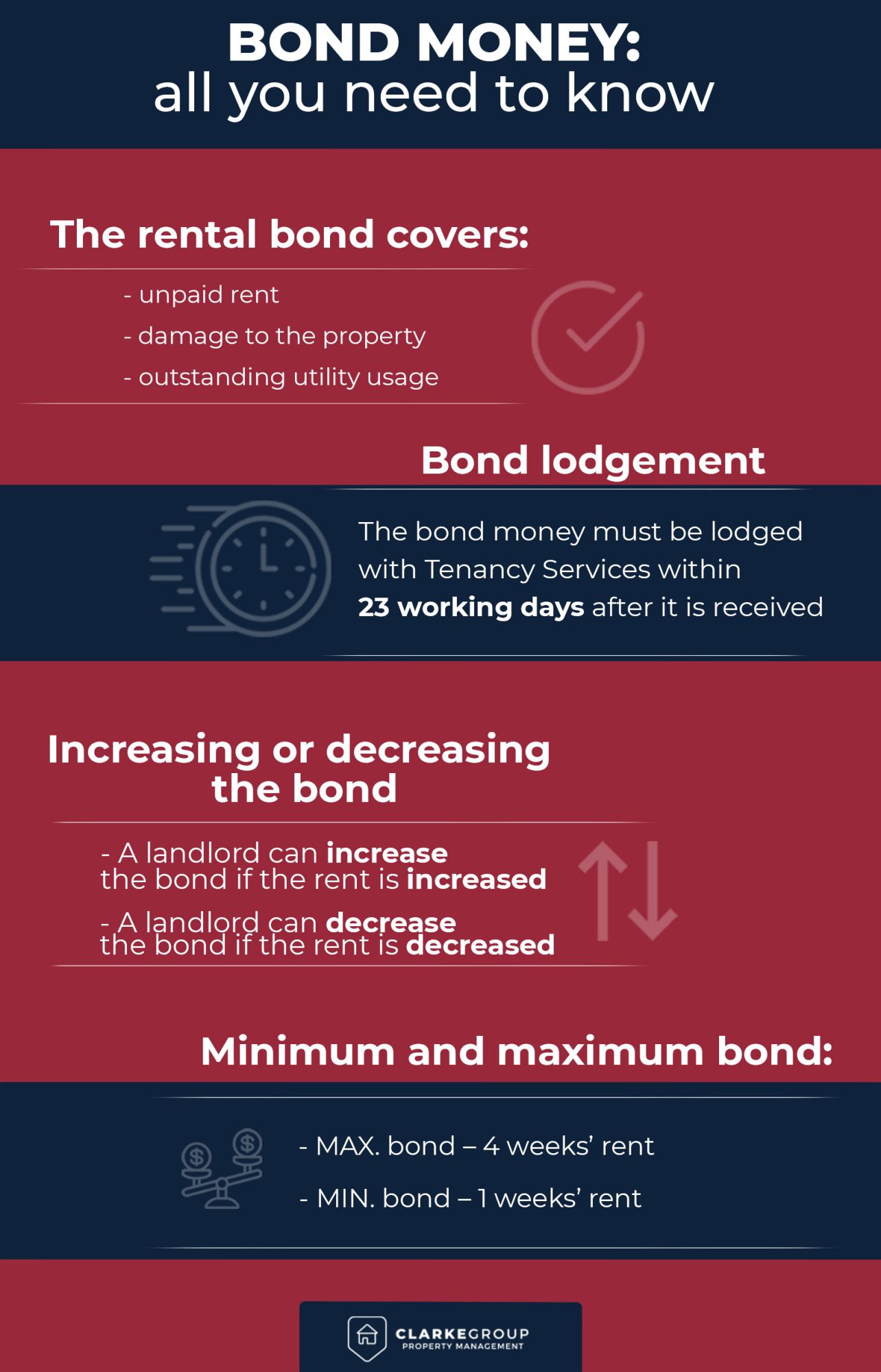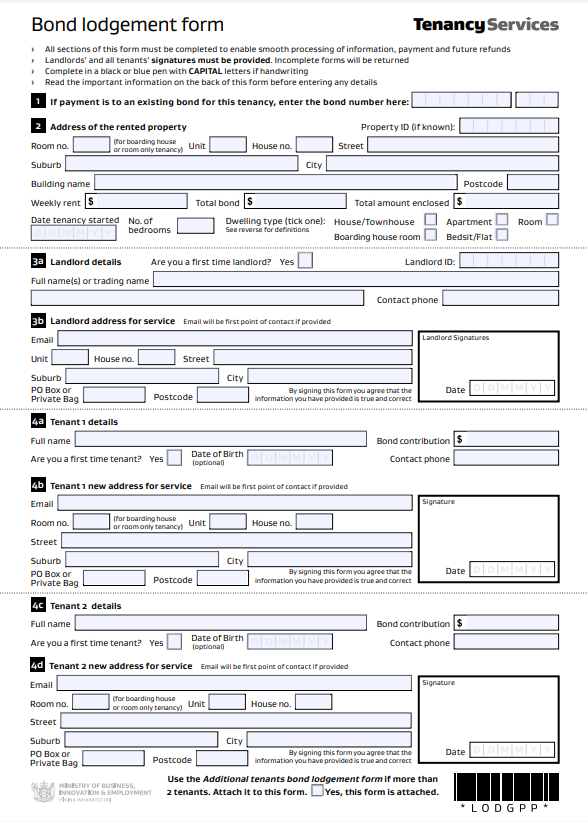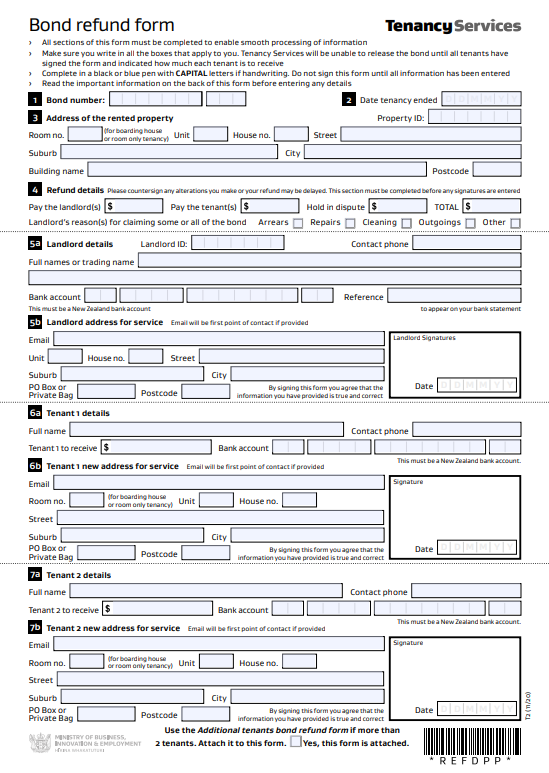
The following information was correct at the time of writing; however it’s an ever-evolving industry so we do recommend doing your own research.
Landlords have many worries, and a common concern is bond money. Where does it go? How can you get it in case your property is damaged? We are here to provide all the help with rental bond information that you may need. We will explain where bond money goes and how to get the maximum of it back. Read on to learn:
- what Tenancy Services say about rental bonds;
- how to pay bond;
- what to do to ensure you are getting bond money back in full.
Bond money definition
To define bond money, one could say a rental bond is a deposit that tenants pay a landlord when they move into a property. The bond is held by Tenancy Services and refunded after a tenancy has ended.
For better undrestanding, watch this nice video of the two cute houses explaining the gist of renting!
Rental bond NZ: What can it cover?
The rental bond can cover situations such as the following:
- Unpaid rent: If a tenant owes rent to the landlord, the landlord will keep the rental bond money.
- Damage to the property: If a tenant has damaged furniture or another part of the property, the landlord will use rental bond money for repairs. Bond money returned to the tenant will be what is left over.
- Outstanding utility usage: If it is established that a tenant hasn’t paid for utilities, e.g. electricity or Internet bills, upon the end of the tenancy, the rental bond will be used by the landlord to cover these expenses.
Minimum and maximum bond
The maximum rental bond payment amount a landlord can ask for is 4 weeks’ rent, while the minimum is 1.
Increasing or decreasing the bond: When does it happen?
A landlord can increase or decrease the bond only in one of two situations:
- If the rent is increased. A landlord may ask the tenant to pay additional bond, in accordance with the increase. However, bond payments can only be increased once in a 12-month period and landlords must provide tenants with one month’s written notice.
- If the rent is decreased. If the rent of a property has decreased, the tenant can apply for a refund of the extra bond that has been paid.
Asking a new tenant to pay a bond: Is it compulsory?
Even though most landlords ask for a bond, it is not compulsory.
Advantages of bond lodgement
Not lodging a bond is unlawful and can get landlords in serious trouble. Landlords will find that lodging the bond guarantees that their money is kept safe for the duration of tenancy and that it gives them a sense of security that they will have money to cover property-related expenses.
Bond lodgement NZ
Lodgement of bond means that the bond paid is transferred to Tenancy Services until the end of the tenancy.
When should the bond be lodged?
The bond payment date, i.e., when it must be lodged with Tenancy Services, is within 23 working days after it is received.
Bond lodgement form NZ
For a free bond lodgement form template, head to this website.
Signing bond lodgement forms
Both the landlord and tenant(s) need to sign the bond lodgement form.
Keeping document records as a landlord
Landlords should keep the bond lodgement form, as well as all documents related to a tenancy, for at least 12 months after the tenancy ends. For tax purposes, landlords will need bond records for 7 years after the tax year to which they relate. Keeping these documents can be useful for landlords for:
- Clearing up any issues related to the tenancy.
- Being prepared for a Tenancy Tribunal hearing, if necessary.
- Providing requested documentation to the Ministry of Business, Innovation and Employment, under the Residential Tenancies Act.
How do you pay a bond?
The bond is paid by the tenant to the landlord or property manager before they move into a rental property. It can be lodged with Tenancy Services by either of these parties.
Bond Payment NZ: Available payment forms
You have several methods for paying a bond.
- As a tenant, you can pay bond online if you are lodging a single bond for 6 tenants or less. You can use a credit card, which is useful for individuals who may need rent bond assistance.
- Landlords and property managers can pay by:
- Direct debit: if they often lodge multiple bonds at a time. This option is preferred by those who don’t want to pay large bank fees.
- Direct credit: if they lodge a bond for more than 6 tenants. This is the fastest option to pay.
You can pay rental bond online on the Tenancy Services website, using the bond lodgement tool.
Rent bond refund NZ
Rent bond refund is when bond money is returned at the end of a tenancy. Depending on the state of the property and any outstanding costs, tenants will either receive the full amount back, part of it or nothing.
Inspecting the property BEFORE signing the bond refund form
Landlords and tenants should remember it is crucial to inspect the property, ideally together, before signing the form for return of bond money. This is to ensure that everything is in order and no damages have been caused for which deductions from bond money would have to be made.
The bond money is:
- returned fully:
- If the property is tidy and undamaged and no rent is due.
- returned partly:
- If minor damage to property, like holes in the walls, is found.
- If less than a month’s rent remains unpaid, in case of a 4 weeks’ rent bond.
- If there is an outstanding utility bill that adds up to less than the bond amount.
- not returned at all:
- If the cost of damages to a property exceeds the amount of the bond, e.g. if tenants have destroyed expensive appliances.
- If the cost for cleaning the property professionally at the end of a tenancy exceeds the bond amount. This is common when tenants ruin carpets, for example.
- If tenants have made alterations to the property without the landlord’s consent and the cost to change them back exceeds the bond amount.
Disagreements about the refund amount
There are sometimes situations when landlords and tenants can’t reach an agreement on the refund amount. In this case, they can either use a mediator or apply to the Tenancy Tribunal. This can be necessary in instances such as the following:
- Disputes about whether damage predates a tenancy.
- Disputes about the cost of repairs to cover damages.
- Disputes about the tidiness level of the property.
Bond refund forms
Need a bond refund form? Visit this page.
Signing bond refund forms
The bond refund form must be signed by the same people who signed the bond lodgement form, i.e., all named tenants and landlord. If it isn’t, it could cause delays in issuing the refund.
What happens if a tenant or landlord can’t sign the bond refund form?
On occasion, one of the people who signed the bond lodgement form is not available to sign the refund forms. This could be because:
- They have already moved away.
- They have passed away.
- They are travelling.
In these cases, landlords and tenants are advised to complete the form and send it to Tenancy Services anyway. Tenancy Services will attempt to find a solution.
Keeping the bond refund document
Landlords should hold on to documents for several years following a tenancy because:
- They will need them for tax purposes.
- They will need them in case they have to apply to the Tenancy Tribunal.
Sending the bond refund form to Tenancy Services
In order to get a refund, the bond refund form must be received and acknowledged by Tenancy Services, or it can’t be processed.
Bond money NZ: When does it actually come back?
It is currently taking up to 5 working days to refund a bond when a fully completed form is received.
Unclaimed bond
Unclaimed bond money becomes the property of the Crown 6 years post-tenancy.
Bond lodgement FAQ
You may be confused by bonds as a landlord, but you don’t have to be. Staying up-to-date with legislations and knowing when and how to send in your bond lodgement and bond refund forms is key for success.
CGPM can streamline this process for you and offer help with bond money lodgement queries and any other questions you have. Don’t hesitate to contact CGPM’s expert real estate team for all your property-related needs.
Below we’ve gathered landlords’ most common questions concerning bond lodgement:
-
What is bond money used for?
Bond money is used by landlords to cover expenses, such as unpaid rent or repairs due to damage to the property.
-
Where does bond money come from?
The tenant pays the bond to the landlord. The bond is then lodged with Tenancy Services.
-
How much of a bond do you have to pay?
Landlords normally ask for at least 1-2 weeks’ rent as bond. By law, they can ask for up to 4 weeks’ rent.
-
When to pay rental bond?
Tenants must give bond to landlords before they move in. This must then be lodged with Tenancy Services within 23 working days.
-
How to pay bond?
You can pay bond online, by direct debit or credit.
-
Can you pay bond with a credit card?
Yes, you can pay for bond with a credit card.
-
How to pay a bond online?
To pay bond online, go to this page.
-
What happens to bond money? Where does my rental bond go?
The bond money is held by Tenancy Services for safekeeping until the end of the tenancy.
-
Do you get bond money back?
If there’s no unpaid rent or other outstanding property-related costs, a tenant should get their bond money back fully.
-
When do you get your bond money back?
Once the bond refund form has been signed by both the landlord and tenant(s) and sent off, you should get the money within ten working days.
-
How to get bond money back?
In order to get bond money back, submit your bond refund form with the Tenancy Services.
-
How long does it take to get bond money back?
It normally takes up to 5 working days to refund a bond when a fully completed form is received.






